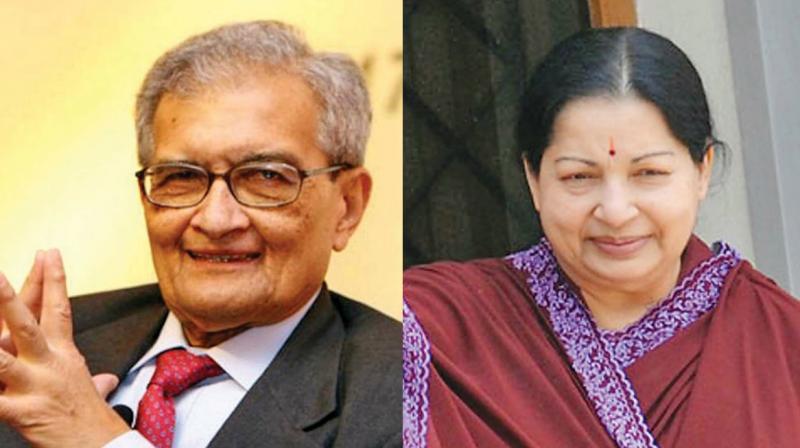Budget echoes: Amartya Sen, Jayalalithaa and federalism debate

CHENNAI: The Economics Nobel laureate Prof. Amartya Sen would hardly approve of the domineering, at times despotic, functional style of Tamil Nadu’s former Chief Minister, J Jayalalithaa. Yet, had she been alive, he would likely give her thoughts on India’s federal structure an empathetic hearing.
For it was Prof. Sen, currently Lamont Professor of Economics and Philosophy at Harvard University, who last year during a visit home flagged the issue of States and Chief Ministers re-visiting the federalism debate, when he said that the Central government should have consulted the States prior to demonetisation of high value rupee currencies in 2016 that had a shattering economic impact.
Even if the “shocks” of demonetisation have “largely faded away”, as emphasised in the latest Economic Survey (2017-18), authored by the Finance Ministry team led by Chief Economic Adviser to the Government, Mr. Arvind Subramanian and tabled in Parliament prior to the Finance Minister, Mr. Arun Jaitley presenting the Union Budget 2018-19 last week, the federalism issue has returned centre-stage.
Ms. Jayalalithaa did not live to see the second of the twin-shocks, the historic rolling out of the ‘Goods and Services Tax (GST)’ from July 1, 2017, about which she had some serious reservations. But what she had not failed to register, apart from Tamil Nadu’s then position on the GST, was about some crucial aspects of Centre-State relations at a meeting of the Inter-State Council (ISC) in New Delhi on July 18, 2016, barely two months before she collapsed. Her speech was read out by her then Finance Minister, Mr. O. Pannerselvam, but relevant even today.
The purpose of the ISC, set up when V P Singh was the Prime Minister in 1990, was to facilitate coordination between the States and the Centre on a whole range of Constitutional and administrative issues, and could well be seen as the parent of the present super-body the GST Council, constituted under the GST Law. The ISC, reconstituted last year under the Chairmanship of the Prime Minister, has in recent years been deliberating on the recommendations of the seven-volume ‘Punchchi Commission’ on Centre-State relations and this is what makes Ms Jayalalithaa’s possibly last assertive text as Chief Minister politically significant in the larger context of the federalism debate.
“The NDA’s ‘cooperative federalism’ will degenerate into empty rhetoric if the States are not given adequate powers and fiscal resources,” she had cautioned in that ISC speech. She not only pressed for amending Article 356 of the Constitution to “incorporate the safeguards inherent in the Bommai case judgment of the Supreme court” to ensure that the proviso was not arbitrarily used to dismiss elected State governments, but also urged, “preventing adventurism” by Governors.
Equally instructive for Centre-State fiscal relations, Ms. Jayalalithaa, while pleading for decentralisation of authority and resources, said post-liberalisation, as political and economic power has shifted away from the Centre to the States, and state-level parties and leaders being “significant players”, “these should not be seen as centrifugal or fissiparous trends that have to be curbed, but a manifestation of India’s nurturing a Nation with diversity and democracy.”
Hopefully, the ISC would continue to have a supervening role vis-à-vis the entire gamut of Centre-State relations, but the semantic outreach of the latest Economic Survey (ES) suggests the possibility of the new ‘GST Council’ taking away much of the ISC’s elevated sheen. The document says, India has created one of the most important “institutional mechanisms for Cooperative Federalism, the GST Council.”
“At a time when International events have been marked by a retreat into economic nativism, and the attending seizing of control, the Indian States and the Centre have offered up a refreshing counter-narrative, voluntarily choosing to relinquish and then pool sovereignty for a larger collective cause.” The ES even further envisages a larger role for the GST Council as “Cooperative Federalism Technology” – a new coinage-, to tackle a wide array of “difficult structural reforms” that involves the States.
These, according to ES, include a wide range from creating a common agricultural market, fixing the SEBs’, to even solving inter-state water disputes. This new “Technology” of ‘Cooperative Federalism’ could be a tool to “even replace untargeted subsidies (like power and fertilisers in agriculture) by direct income support,” the ES points out. It gives the impression that a fast-tracked ‘GST Council’, would come to be the mainstay in the new redrawing of Centre-State relations wherein the dice is loaded in favour of a strong national government.
While the ‘Aadhar-Jan Dhann-Mobile interface’ and the move towards more digital, cashless transactions is one facet of this new ‘monism’ in the transactional culture emerging alongside the GST regime, its implications for Centre-State relations and the federal principle, traditionally understood as not intruding into the State’s powers in a multi-lingual, multi-ethnic country, are equally large.
More and more centralised decisions, whether it be a one-off act like demonetisation or any other policy pronouncement through the ‘GST Council’, or through the budget, is thus logically bound to marginalise the role of States.
No wonder the first cries of “our state” being ignored by the Central budget has come from the Andhra Pradesh Chief Minister, N Chandrababu Naidu and Punjab Chief Minister, Amrinder Singh. Ms Jayalalithaa, had she been around, would have expressed the same objections now, as part of revisiting the federalism debate, alluding to the spirit of Prof Amartya Sen’s call following the demonetisation step.
The predicament of the States has been brilliantly summed up by Prof. Harihar Bhattacharya, professor of Political Science, University of Burdwan, West Bengal, in his “Federalism over Democracy in India- Dialectics of Diversity-claims over Equality-claims” thus: “With India’s shift to a free market economy since the early 1990s’, Indian federal democracy is confronting an evolving, but contradictory reality.” Whether economic growth at any cost should get precedence over poverty alleviation will be an alternating dialectic, depending on the pre-election moods. Mr. Jaitley’s latest budget is partly a reflection of that bigger dilemma.

